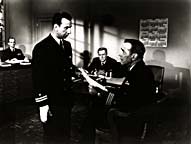
The Caine Mutiny (1954)

The Caine Mutiny (1954) Edward Dmytryk's film was only one of three major adaptations of Herman Wouk's Pulitzer Prize-winning novel. It also became a very successful Broadway play and an MTV teleplay.
Ensign Willie Keith (Robert Francis), Lt. Steve Maryk (Van Johnson), and Lt. Tom Keefer (Fred MacMurray) are shipmates early in WWII aboard the Caine, a minesweeper. Capt. DeVriess (TomTully) is replaced by Capt. Philip Francis Queeg (Humphrey Bogart), in one of his greatest performances). Capt. Queeg boards the ship as her new captain and immediately establishes both his power over the officers and men. He is so intent on operating by the book and running a spotless ship that in the midst of target practice, he berates a young tar and loses control of the ship, which promptly sails in a circle and cuts her own tow line.
Additional incidents follow indicating that Capt. Queeg is suffering from stress. Lt. Maryk begins to keep a log on Capt. Queeg's behavior, and Lt. Tom Keefer encourages Maryk to believe that the Captain is a dangerous psychopath. During a storm at sea, Capt. Queeg appears indecisive, and Lt. Maryk invokes a Navy rule regarding relief of a captain in an emergency. The ship is saved, but Lt. Maryk is court-martialed.
Lt. Barney Greenwald (Josť Ferrer), a naval aviator who was a lawyer in civilian life, is assigned to defend the young lieutenant against Lt. Cmdr. Challee (E.G. Marshall) for the Navy's prosecution. Evidence mounts against Lt. Maryk when his fellow officers (especially Keever) back away from assuming any responsibility for his actions, even though they had encouraged him at the time. In the film's climactic sequence. Lt. Greenwald gets Capt. Queeg on the stand and goads him into exposing his precarious mental state.
In the movie's most famous scene, Capt. Queeg reaches for the steel ball bearings that he always carries and begins to play with them to ease the tension of the moment. The other naval officers now realize that Capt. Queeg is cracking up, and the charges against Lt. Maryk are dismissed. Later, at a celebration, Lt. Greenwald arrives and tells off the crew, citing Capt. Queeg's long record as a lifetime sailor who was protecting the United States' shores years before these civilian types entered the wartime service. Lt. Greenwald finishes his monolog by tossing his champagne in the face of the real villain, Lt. Keefer.
The scenes of Bogart disintegrating on the witness stand have become a memorable part of American film history. Bogart was later asked how he managed to totally capture the paranoid personality of Queeg. "Simple," he answered, "everybody knows I'm nuts, anyway." In a year other than the one in which On the Waterfront was released, this film and its star might have won Oscars for Best Picture and Best Actor (Bogart was nominated, but Marlon Brando took home the trophy).
The love story between May Wynn and Keith often seems unrelated to the film's main plot (as does the World War II subplot in The Man in the Gray Flannel Suit) The romance did not appear in the play, but novelist-playwright Wouk didn't object to its addition, perhaps because Willie Keith's personal life adds a narrative line which is familiar in films of the 1950s. It also reflects Hollywood's desire to make the war film more appealing to women.
Rich Willie Keith (Princeton, 1941) serves as the mediator between the action and the audience. His initiation into the world of professional military men charts the process of maturation expected of men of the era, just as his mother exemplifies what women were not supposed to be. Willie (note the diminutive nickname) must leave the world of his overprotective mother and accept the responsibility becoming an adult. He must overcome come both class prejudices and oedipal pressures. His acceptance of the lower-class Mae Wynn and his refusal to allow his mother to use her political influence to get him a safe assignment in Washington parallel his discovery of the logic of Barny Greenwald's attack on the insidious Keever. Capt.Tunny greets him with the admonition, "I hope you're good enough for the Caine." By the film's conclusion, Keith has proved good enough, and he rejoins his old commanding officer aboard a new destroyer where he will presumably serve with distinction. He has grown up.
Cast
Humphrey Bogart, Capt. Philip Francis Queeg
Jose Ferrer, Lt. Barney Greenwald
Van Johnson, Lt. Steve Maryk
Fred MacMurray, Lt. Tom Keefer
Robert Francis, Ens. Willie Keith
May Wynn, May Wynn
Tom Tully, Capt. DeVriess
E.G. Marshall, Lt. Cmdr.Challee
Arthur Franz. Lt. Paynter
Lee Marvin, Meatball
Warner Anderson, Capt. Blakely
Production Credits
Producer, Stanley Kramer
Director, Edward Dmytryk
Writers, Stanley Roberts and Michael Blankfort (based on the play and novel by Herman Wouk)
Cinematographer, Franz Planer (Technicolor)
Editors,: William Lyon and Henry Batista
Music Composer: Max Steiner .